PRINCETON, NJ -- Historically, support for environmental protection in the United States has been relatively nonpartisan. Republicans pointed with pride to Theodore Roosevelt's crucial role in promoting the conservation of natural resources by establishing national parks and forests, and Democrats applauded Franklin Delano Roosevelt's efforts to include conservation as part of the "New Deal" via the Soil Conservation Service and related programs. Especially notable was how Richard Nixon collaborated with a Democratic Congress by signing several of our nation's most important pieces of environmental legislation into law in the late 1960s and early 1970s.
The situation began to change in the 1980s, as the Reagan administration labeled environmental regulations a burden that needed to be eased. While a temporary backlash from environmentalists and much of the public resulted, Republicans nonetheless enjoyed a good deal of electoral success in arguing that "government is the problem, not the solution." This theme has been amplified in passing decades, and one consequence has been a growing partisan divide over environmental protection (and other government programs).
The divide was most noticeable among political elites, such as members of Congress, who tend to be more ideologically polarized than is the general public. What had been a modest, but significant, difference in Republican and Democratic levels of pro-environmental voting in Congress since 1970 became a noticeable gap after the Republican takeover of the House of Representatives in 1994.[i] In the past decade, it has become a chasm in both the House and Senate, as reflected in recent voting "scorecards" issued by the League of Conservation Voters.
Nonetheless, partisan differences in support for environmental protection among the general public remained relatively modest. For example, from the early 1970s until the mid-1990s, support for increased spending on environmental protection by self-identified Democrats was typically only around 10 points higher than for self-identified Republicans.[ii] The gap began to widen in the late 1990s, likely reflecting voters' tendency to follow cues from party leaders and political pundits.
Nowhere is the partisan gap on environmental issues more apparent than on climate change. Beginning in the 1990s, particularly in 1997, when the Kyoto Protocol calling for reduced CO2 emissions was established, conservative commentators such as Rush Limbaugh began to critique both the evidence for global warming and proposals for reducing carbon emissions. It would appear that the vigorous conservative campaign against climate-change advocates (especially Al Gore) has contributed to leaders of the Republican Party adopting a highly skeptical view of global warming.
Recent Gallup Poll results suggest that this skepticism among Republican and conservative elites has led rank-and-file Republicans to follow suit, as currently there is a large gap between self-identified Republicans and Democrats in terms of perceptions of global warming. The growing gap is apparent in results from a decade of Gallup polling on the issue, including the results from this year's Gallup Environment Poll, conducted March 6-9, 2008.
Is Global Warming Occurring?
When asked their views on when the effects of global warming will begin to happen, 61% of Americans currently say "they have already begun to happen." This is a modest increase from 1997, when only 48% gave this response. However, while over three-fourths of Democrats (76%) believe global warming is already happening, only 41% of Republicans share that view.
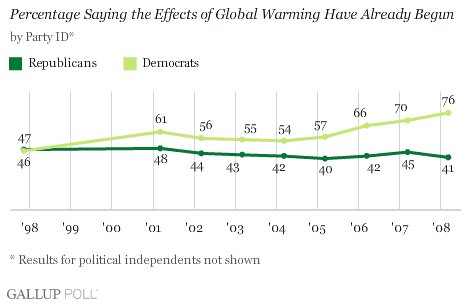
The resulting 35-point gap stands in stark contrast to 1997, when nearly identical percentages of Republicans and Democrats (47% and 46%, respectively) indicated that global warming was already happening. Thus, despite all of the attention given to global warming in the media, including coverage of the IPCC (Intergovernmental Panel on Climate Change) reports, Republicans have become less likely over the past decade to believe that global warming is occurring.
In contrast, Democrats have become more likely to perceive that the effects of global warming have already begun, as have independents. While independents have generally been closer to Democrats than to Republicans in seeing global warming as already happening -- and were more likely than Democrats to do so in 1997 and 2005 -- this year, they are 14 points below Democrats (62% versus 76%).
Views of Media Coverage
Most laypersons obtain information on global warming from news media, and on the surface it appears that public views concerning media coverage of global warming have been relatively stable over the past decade. The belief that the seriousness of global warming is "generally exaggerated" has increased only slightly since 1997, rising from 31% then to 35% in 2008. However, this stability masks very different trends among Democrats and Republicans.
While the percentage of Democrats who view the news about global warming as being exaggerated has been fairly stable, at 23% in 1997 and 18% this year, the percentage of Republicans taking this view has increased dramatically -- from 34% to 59%. The result is a 41-point difference between adherents of the two major parties. Growing skepticism about news coverage of global warming clearly goes hand in hand with Republicans' declining belief that it is already occurring.
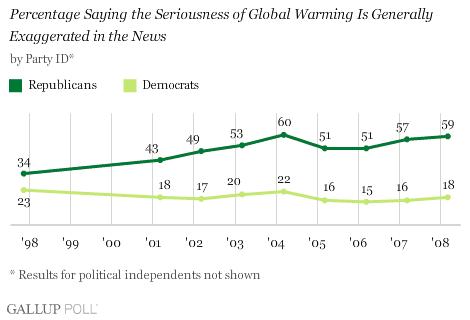
Independents have remained in between Republicans and Democrats in terms of viewing news on global warming as exaggerated, although they are consistently closer to Democrats.
Is There a "Scientific Consensus"?
Republican spokespersons and conservative commentators have long challenged IPCC reports as reflecting the "scientific consensus" on global warming by highlighting the views of a modest number of "skeptic" or "contrarian" scientists who question the IPCC conclusions. One result is that in their efforts to provide "balanced coverage," U.S. media have given disproportionate attention to the skeptics, creating the impression of less scientific consensus on global warming than exists within the mainstream scientific community.[iii] As a consequence, American newspapers' portrayal of global warming as a scientifically controversial issue differs significantly from the image presented by the media in other nations.[iv]
There has nonetheless been a sizable increase over the past decade in the percentage of Americans who agree that "most scientists believe that global warming is occurring," from 48% in 1997 to 65% this year. Republicans, independents, and Democrats have all become more likely to see most scientists as believing in global warming.
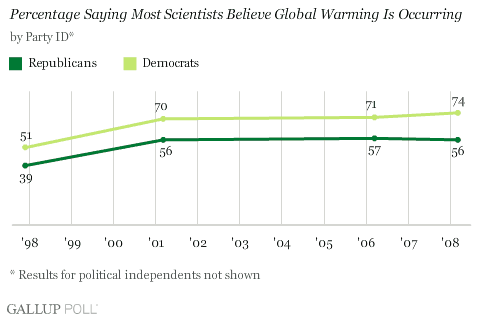
Not surprisingly (in view of trends for the two prior questions), the belief that at least most scientists accept global warming as real has increased more among Democrats (from 51% to 74%) than among Republicans (from 39% to 56%). The resulting difference of 18 points in this year's poll is lower than for the prior items, but still substantial. Once again, independents fall in between, with 63% saying most scientists agree that global warming is occurring.
Human Caused or Natural Change?
The IPCC has not only asserted that global warming is occurring, but that to a large degree it is caused by human activities such as burning fossil fuels rather than being a natural phenomenon. Gallup has tracked Americans' views of this issue only since 2003, and the results have been relatively stable since then. This year, 58% see global warming as due more to human activities than to natural causes, similar to the 61% in 2003.
Once again, this stability among the overall population hides differing trends among Republicans and Democrats. While Republicans' belief in human-induced global warming has declined 10 percentage points from 2003 to 2008 (from 52% to 42%), Democrats' belief has been steady (possibly even rising slightly, though the increase from 68% to 73% is not statistically significant). The result is a substantial 31-point gap between adherents of the two major parties. Interestingly, while independents were originally quite close to Democrats on this issue, they moved a bit closer to Republicans in this year's poll, with 55% seeing global warming as more due to human activities.
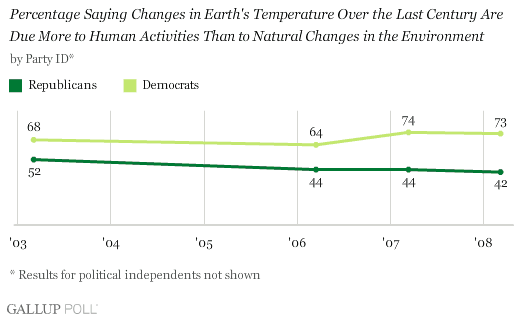
Is Global Warming a Threat?
The final global warming question in Gallup's annual environment survey deals with the crucial issue of whether global warming is seen as posing a serious threat. There has been moderate growth in the percentage of Americans viewing global warming as "a serious threat" to themselves or their way of life during their lifetimes, from 25% in 1997 to 40% this year.
Unlike the prior items, the trends for this one are fairly similar for Republicans and Democrats. After experiencing only minor fluctuations from 1997 to 2006, this year there was a small but noticeable rise in Republican agreement that global warming is a serious threat -- reaching 29%. Yet the increase among Democrats was greater, from 36% to 50% -- fully half of Democrats in this year's poll. A current gap of 21 points between Democrats and Republicans is the result.
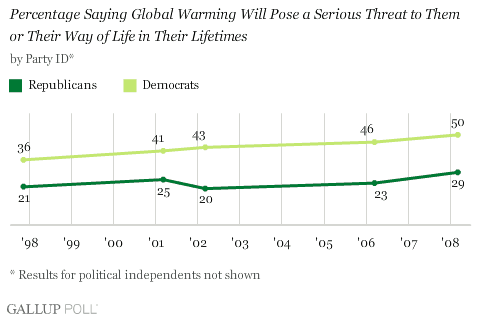
Particularly interesting is the increase in independents' view of global warming as a serious threat, as it has doubled since 1997 to reach 40% in this year's poll. While originally close to Republicans on this issue, independents have become noticeably more likely than Republicans to see global warming as a serious threat.
Summing Up
Overall, Gallup has documented changes in Americans' views of global warming over the past decade. There has been a slight increase in the percentage of Americans who view global warming as already happening, and a more substantial increase in the percentage who believe that a majority of scientists think global warming is occurring, with the result that more than 6 in 10 Americans endorse both views (61% and 65%, respectively). There has also been a sizable increase in the percentage saying global warming will pose a serious threat within their lifetimes, although it is still a minority position at 40%. In contrast, there has been only a slight increase in the percentage saying the seriousness of global warming has been exaggerated, as just over a third of Americans currently express this view. Finally, there has been virtually no change in the percentage agreeing that global warming is due more to human activities, with 6 in 10 Americans holding this view.
What these trends often mask, however, are highly divergent trends among Republicans and Democrats. As noted above, the proportions of Democrats agreeing that global warming is already happening, that most scientists believe it is occurring, and that it will pose a serious threat in their lifetimes have increased substantially over the past decade. At the same time, the proportions of Republicans agreeing that most scientists believe global warming is occurring and that it poses a serious threat have both increased, but more modestly than is true among Democrats, while the proportion of Republicans agreeing that global warming is already happening has declined a bit.
The proportion of Republicans who believe news of global warming's seriousness is exaggerated has grown substantially over the past decade, while the proportion of Democrats expressing this view has been fairly steady. A similar pattern of diverging partisan views has also occurred on the issue of attributing global warming to human activities.
The result of these trends is that there are currently stark differences in Republicans' and Democrats' views of global warming. The claim that environmental protection would be a "motherhood" issue that would unite the nation, commonly made in the early 1970s, has clearly not come to pass -- particularly when it comes to global warming.
Will There Be a McCain Effect?
The fact that presumptive Republican presidential nominee John McCain has been a leader in the U.S. Senate in terms of recognizing the seriousness of global warming and proposing legislation designed to reduce carbon emissions raises interesting questions. Will McCain's efforts to demonstrate his green credentials by supporting policies designed to limit carbon emissions cause the Republican Party to re-evaluate its current stance toward global warming? Or will McCain remain a "climate-change maverick" within his party? Will rank-and-file Republicans who question the seriousness of global warming move toward their candidate's position on the issue, or maintain their generally skeptical views? Only time will tell.
Riley E. Dunlap is Regents Professor of Sociology at Oklahoma State University and Gallup Scholar for the Environment with Gallup.
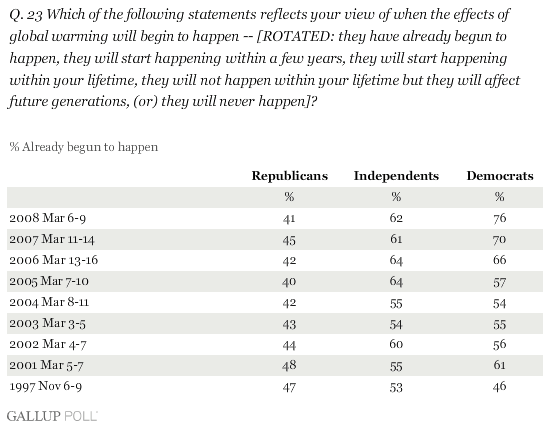
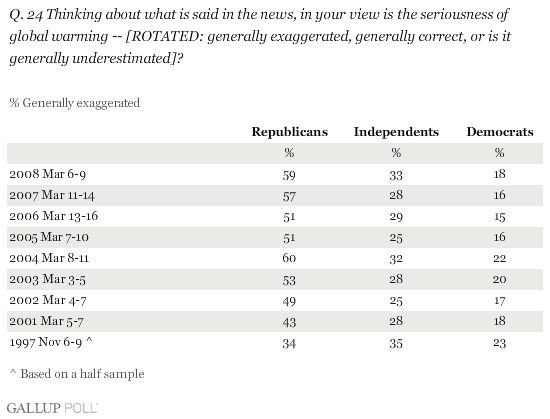
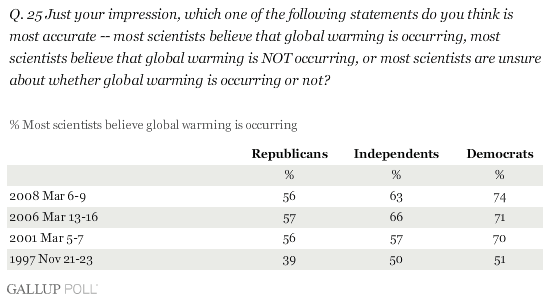
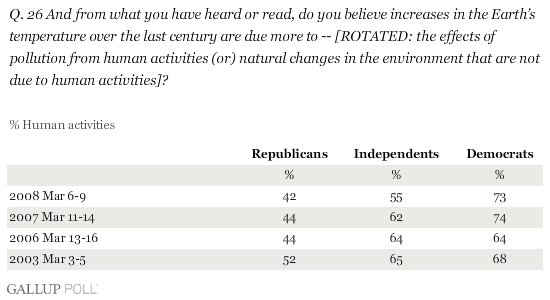
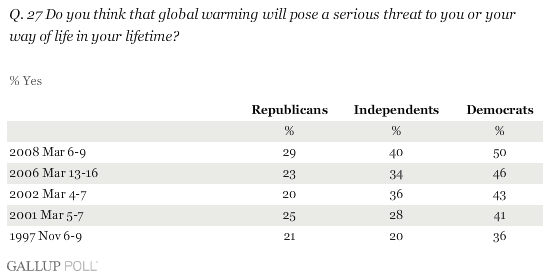
[i] See Dunlap, R.E., Xiao, C., & McCright, A.M. (2001). Politics and environment in America: Partisan and ideological cleavages in public support for environmentalism. Environmental Politics, 10(4), 29.
[ii] Ibid., p. 31.
[iii] See, e.g., Boycoff, M.T., & Boycoff, J.M. (2004). Balance as bias: Global warming and the US prestige press. Global Environmental Change, 14, 125-136.
[iv] See, e.g., Dispensa, J.M., & Brulle, R.J. (2003). Media's social construction of environmental issues: Focus on global warming -- a comparative study. International Journal of Sociology and Social Policy, 23(10), 74-105.
